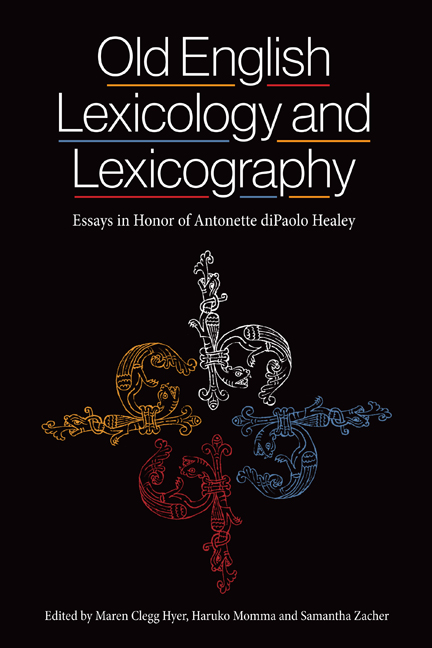Book contents
- Frontmatter
- Dedication
- Contents
- List of Illustrations
- List of Contributors
- Acknowledgements
- Abbreviations
- Introduction
- I Old English Poets and their Word-Craft
- 1 Beowulf and the Art of Invention
- 2 Juliana 53a Revisited (hætsð hæþenweoh)
- 3 Wounds and Compensation in the Old English Soul and Body Poems
- II Old English Homiletic Tradition
- 4 Defining and Redefining: Ælfric's Access to Gregory's Homiliae in Evangelia in the Composition of the Catholic Homilies
- 5 Lambeth Homily 4 and the Textual Tradition of the Visio Pauli
- 6 ‘A Vision of Souls’: Charity, Judgment, and the Utility of the Old English Vision of St. Paul
- 7 The Vocabulary of Sin and the Eight Cardinal Sins
- III Anglo-Saxon Institutions
- 8 The King (and Queen) and ‘I’: Self-Construction in Some Anglo-Saxon Royal Documents
- 9 Anglo-Saxon Maccabees: Political Theology in Ælfric's Lives of Saints
- 10 Nunne in Early Old English: Misogyny in its Literary Context
- IV Lexis of the Quotidian
- 11 Cingulum est custodiam: Semiotics and the Semantic Range of gyrdels
- 12 Island Time: The English Day and the Christian Hours
- 13 ‘Revising Hell’: The Voices of Teachers in Anglo-Saxon Studies and Anglo-Saxon England
- V The Task of the Lexicographer
- 14 Cryptography and the Lexicographer: Codifying the Code
- 15 Genre and the Dictionary of Old English
- Epilogue: Word-Hord
- 16 Reading Beowulf with Isidore's Etymologies
- An Old English Lexicon Dedicated to Toni Healey
- Toni Healey: A Tribute
- List of publications of Antonette diPaolo Healey
- Index
- Tabula Gratulatoria
- Miscellaneous Endmatter
- Anglo-Saxon Studies
9 - Anglo-Saxon Maccabees: Political Theology in Ælfric's Lives of Saints
Published online by Cambridge University Press: 17 September 2020
- Frontmatter
- Dedication
- Contents
- List of Illustrations
- List of Contributors
- Acknowledgements
- Abbreviations
- Introduction
- I Old English Poets and their Word-Craft
- 1 Beowulf and the Art of Invention
- 2 Juliana 53a Revisited (hætsð hæþenweoh)
- 3 Wounds and Compensation in the Old English Soul and Body Poems
- II Old English Homiletic Tradition
- 4 Defining and Redefining: Ælfric's Access to Gregory's Homiliae in Evangelia in the Composition of the Catholic Homilies
- 5 Lambeth Homily 4 and the Textual Tradition of the Visio Pauli
- 6 ‘A Vision of Souls’: Charity, Judgment, and the Utility of the Old English Vision of St. Paul
- 7 The Vocabulary of Sin and the Eight Cardinal Sins
- III Anglo-Saxon Institutions
- 8 The King (and Queen) and ‘I’: Self-Construction in Some Anglo-Saxon Royal Documents
- 9 Anglo-Saxon Maccabees: Political Theology in Ælfric's Lives of Saints
- 10 Nunne in Early Old English: Misogyny in its Literary Context
- IV Lexis of the Quotidian
- 11 Cingulum est custodiam: Semiotics and the Semantic Range of gyrdels
- 12 Island Time: The English Day and the Christian Hours
- 13 ‘Revising Hell’: The Voices of Teachers in Anglo-Saxon Studies and Anglo-Saxon England
- V The Task of the Lexicographer
- 14 Cryptography and the Lexicographer: Codifying the Code
- 15 Genre and the Dictionary of Old English
- Epilogue: Word-Hord
- 16 Reading Beowulf with Isidore's Etymologies
- An Old English Lexicon Dedicated to Toni Healey
- Toni Healey: A Tribute
- List of publications of Antonette diPaolo Healey
- Index
- Tabula Gratulatoria
- Miscellaneous Endmatter
- Anglo-Saxon Studies
Summary
When Christian authors issued calls to arms to fight in the Crusades, they habitually turned to Old Testament figures for inspiration. The Maccabees became veritable avatars for this project: the New Knights of the Crusades were dubbed New Maccabees, in the hope that they too would ‘triumph over the wildness of peoples that did not invoke [God’s] name’. This ubiquitous textual analogue performed powerful ideological work: it forged an analogy between Temple and Church in order to exclude infidel Muslim beliefs, practices, and religious spaces. More importantly, it provided a powerful vehicle for re-framing the Crusader struggle to liberate Jerusalem from Saracen forces as the ‘reclaiming’ of their rightful homeland, rather than as a new conquest waged in a foreign land. Although the Fathers of the Church (especially Ambrose, Augustine, and Isidore) had accepted the need for defensive war, they found it more challenging to justify offensive measures according to the inherited apostolic paradigms of pacifism. The appropriation of the Maccabean story allowed authors to recast what was nominally an offensive war overseas as a defensive Holy War for the Promised Land according to authorized Old Testament and Deuterocanonical models. The Maccabees were better suited for this project than were the great kings and leaders of the Old Testament proper, since the first two books of Maccabees were composed after the closing of the Old Testament canon by authors living in the diaspora. Its heroes represented an extension of God's divine plan beyond the classical period of covenant, and therefore provided a direct model for Christians who believed themselves to be the newly Chosen People.
This Crusader focus on the Maccabean warriors marked a new development in Christian exegesis on the books of Maccabees. Before the ninth century, Christian authors wrote almost exclusively about the Maccabean martyrs as prototypes for Christian saints. The Maccabean martyrs were, in fact, the only such ‘Old Testament’ types to be included in the Christian liturgical calendar (for August 1).
- Type
- Chapter
- Information
- Old English Lexicology and LexicographyEssays in Honor of Antonette diPaolo Healey, pp. 143 - 158Publisher: Boydell & BrewerPrint publication year: 2020



